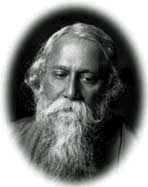

 |  |
|
 Tagore, Rabindranath (1861-1941), one of the greatest poets of modern India, received the 1913 Nobel Prize for literature. A song that he composed for the Indian National Congress became the national anthem of India. Another of his songs "Amar Sonar Bangla" (My Golden Bengal) became the national anthem of Bangladesh.
Tagore, Rabindranath (1861-1941), one of the greatest poets of modern India, received the 1913 Nobel Prize for literature. A song that he composed for the Indian National Congress became the national anthem of India. Another of his songs "Amar Sonar Bangla" (My Golden Bengal) became the national anthem of Bangladesh.
Tagore's dignity and strength of character, and the energy and beauty of his art remain an inspiration to the people of Bengal. International appreciation of his genius declined after his death. But later, his reputation in Western countries grew again, because of new and accurate translations of his work. Tagore wrote in the Bengali language. His collected poems, stories, novels, plays, and essays take up 26 volumes. He also composed more than 2,000 songs. In all his works, he tried to express the divine and poetic spirit he saw in nature. He also attempted to understand the workings of society and history. He used many sources and traditions, from poetry written in the ancient, Indian language of Sanskrit to Western prose fiction. Some conservative commentators criticized his daring experiments with new styles and forms. Tagore loved his country and worked tirelessly for its advancement. But he was never a narrow nationalist. He saw nationalism as one of the main causes of war. He detested British colonial rule in India. But he believed that India should learn from the best of Western civilization. In the early 1900's, the governor of India, Lord Curzon, decided to divide Bengal into two separate provinces. This provoked a movement opposed to the purchase of British goods. Tagore lent his support with speeches and patriotic songs. But he withdrew when the movement led to bomb attacks against the British and riots between Hindus and Muslims. In 1919, he protested against General Dyer's troops killing unarmed people at Amritsar by returning the knighthood the British had given him. His friendship with the Indian leader Mohandas Gandhi was complex. He acknowledged his greatness by giving him the title Mahatma, which means Great Soul. But he feared that Gandhi had let loose uncontrollable forces in India. next page >> |
Copyright ©2000 indiansaga.info. All rights reserved.
By using this service, you accept that you won't copy or use the data given in this website for any commercial purpose.
The material on indiansaga.info is for informational & educational purpose only.
This site is best viewed at 800 X 600 picture resolution.